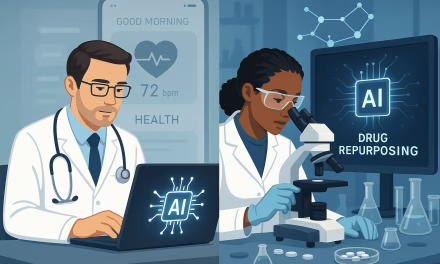# Digital Twins Transform Type 1 Diabetes Management as AI Healthcare Faces Demographic Divide
The healthcare industry is witnessing a revolutionary breakthrough in diabetes management through the implementation of AI-powered digital twins, while simultaneously grappling with significant demographic disparities in AI acceptance that could impact the technology’s widespread adoption. This dual narrative emerged prominently during the 2025 Artificial Intelligence in Healthcare Summit, held June 9-10, where industry leaders gathered to discuss the latest innovations and challenges in medical AI.
Digital twin technology represents one of the most promising applications of artificial intelligence in healthcare, creating virtual replicas of patients that can simulate physiological responses and predict treatment outcomes. For individuals with Type 1 diabetes, these sophisticated AI models are proving transformative, offering unprecedented precision in blood glucose management and insulin dosing recommendations. The technology analyzes continuous streams of data from glucose monitors, insulin pumps, and lifestyle factors to create personalized treatment protocols that adapt in real-time to each patient’s unique metabolic patterns.
The impact of digital twins on diabetes care cannot be overstated. Traditional diabetes management relies heavily on patient self-monitoring and periodic clinical assessments, often resulting in suboptimal glucose control and increased risk of complications. Digital twin technology fundamentally changes this paradigm by providing continuous, intelligent monitoring that can predict glucose fluctuations hours in advance, enabling proactive rather than reactive treatment adjustments.
However, the promise of AI-driven healthcare innovations like digital twins faces a significant challenge revealed in groundbreaking research published in JAMA Network Open. The study, which examined patient attitudes toward AI in healthcare, uncovered concerning demographic disparities in AI acceptance that could limit the technology’s reach to those who might benefit most from it. The research found that women, individuals in poorer health, and people who are less technologically adept show significantly more resistance to AI-powered healthcare solutions.
These findings are particularly troubling given that Type 1 diabetes affects individuals across all demographic groups, and those with more complex health conditions—who might benefit most from digital twin technology—are among the most hesitant to embrace AI-driven solutions. The research suggests that successful implementation of AI healthcare technologies requires addressing not just technical challenges, but also the social and psychological barriers that prevent certain populations from accessing these innovations.
The demographic divide in AI healthcare acceptance reflects broader societal concerns about artificial intelligence, including fears about data privacy, algorithmic bias, and the potential for technology to replace human judgment in medical decision-making. For women, who historically have been underrepresented in medical research and technology development, skepticism about AI healthcare may stem from concerns about whether these systems adequately account for gender-specific health considerations.
The American Medical Association has acknowledged these challenges while reporting that physicians are increasingly warming to AI integration in clinical practice. However, the organization emphasizes the critical importance of responsible development and transparent implementation of AI healthcare tools. This balanced approach recognizes both the tremendous potential of AI technologies and the legitimate concerns that patients and healthcare providers have about their deployment.
The National Academy of Medicine recently hosted a significant convening focused on orienting AI toward health workforce well-being, addressing the growing concern about physician burnout and exploring how AI can enhance rather than replace clinical expertise. The discussion highlighted how AI tools like digital twins can streamline workflows, reduce administrative burdens, and improve job satisfaction for healthcare professionals while maintaining the human connection that remains central to effective medical care.
For diabetes patients, the benefits of digital twin technology extend far beyond improved glucose control. The technology can help identify patterns and triggers that might not be apparent through traditional monitoring methods, enabling more personalized lifestyle recommendations and treatment adjustments. Patients report feeling more confident in their diabetes management and experiencing fewer episodes of dangerous glucose fluctuations when using AI-powered monitoring systems.
The technology also offers significant advantages for healthcare providers, who can access comprehensive, real-time data about their patients’ condition between appointments. This continuous monitoring capability enables more informed clinical decisions and allows for timely interventions that can prevent serious complications. Healthcare systems implementing digital twin technology for diabetes management report improved patient outcomes and reduced emergency department visits related to glucose management issues.
Despite these promising developments, the demographic disparities in AI acceptance pose a significant challenge for equitable healthcare delivery. Healthcare organizations must develop targeted strategies to address the concerns of hesitant populations while ensuring that AI technologies are designed and implemented in ways that build rather than erode patient trust.
The path forward requires a multifaceted approach that combines technological innovation with thoughtful attention to patient education, cultural sensitivity, and inclusive design principles. Healthcare providers must be prepared to address patient concerns about AI technologies while demonstrating their safety, efficacy, and commitment to preserving the human elements of medical care that patients value most.
As the healthcare industry continues to embrace AI technologies like digital twins, the success of these innovations will depend not just on their technical capabilities, but on their ability to gain acceptance across diverse patient populations. The challenge lies in ensuring that the transformative benefits of AI-powered healthcare reach all patients who could benefit from them, regardless of their demographic characteristics or technological comfort level.
The future of AI in healthcare, exemplified by breakthrough applications like digital twins for diabetes management, holds tremendous promise for improving patient outcomes and quality of life. However, realizing this potential requires addressing the complex social and cultural factors that influence patient acceptance of these technologies, ensuring that AI-driven healthcare innovations serve all patients equitably and effectively.





